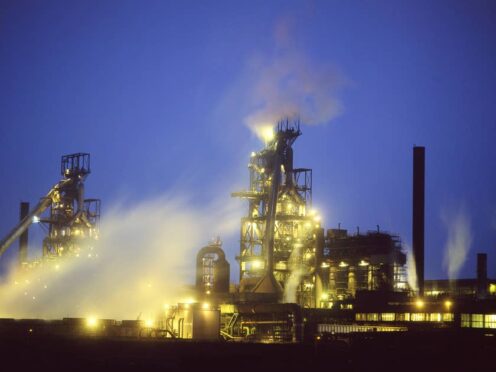Steel giant Tata has confirmed it will shut down blast furnaces at its biggest plant with the loss of thousands of jobs after rejecting a last-minute union plea to change its plans.
The company said that after seven months of discussions with unions it will proceed with its £1.25 billion investment to build an electric arc furnace in Port Talbot, South Wales and start closure of the existing heavy end assets in the following months.
Unions and Labour criticised the decision, warning it will have a devastating effect on the industry and Welsh economy.
Tata said it was planning the biggest investment in the steel industry for decades, safeguarding the industry, preserving 5,000 jobs and securing future supplies to customers.
Unite members have already voted to strike in protest at the plans while Community and the GMB are currently holding ballots for industrial action.
Tata told unions on Thursday that Port Talbot’s two blast furnaces will close by end of June and end of September respectively.
The company said a multi-union proposal to maintain one blast furnace through the transition would have incurred at least £1.6 billion of additional costs.
Tata said it has offered its most generous severance terms ever to affected employees, under a financial support plan, alongside wide-ranging retraining and community support schemes.
A voluntary redundancy process will be launched next month.
Tata Steel’s chief executive and managing director, T V Narendran, said: “Having looked carefully at all the options over the past seven months in consultation with union representatives, we have decided to proceed with our proposed restructuring and transition.
“This is the most viable proposal, in contrast to the unions’ unaffordable plan which has high inherent operational and safety risk.
“Our proposal secures a long-term future for the business and preserves the majority of jobs in the UK.
“We will continue to work with the trade unions over the following two weeks to agree a memorandum of understanding on the future of the UK business and the impact on our people.
“Tata Steel is committed to creating a low-CO2 steel business at the heart of a green industrial ecosystem in Wales and the wider UK to safeguard steel supplies and create economic opportunities for generations to come.”
A Downing Street spokeswoman said: “For the government’s part, we stepped in with an important support package to support the continued viability of the industry so it is able to continue to operate for the future. That was right to do.”
Community general secretary Roy Rickhuss said after the meeting: “It’s incredibly disappointing that Tata have chosen to reject the multi-union plan, which is an ambitious and viable alternative to their destructive bad deal for steel.
“We do not accept the company’s assertion our plan was too expensive. In fact, it would have returned the company to profits, and the additional capital expenditure needed to make it a reality could have been funded by an additional £450m from the government – a drop in the water compared to what other European countries are investing in their domestic steel industries.
“Tata have made their decision, and our members will decide on our collective response. Tata made a proposal to negotiate a package with the unions to give us firm assurances on jobs and future investment, and we will consult our members on how we proceed.
“We want to make one thing absolutely clear to the company: this isn’t over – not by a long shot.”
Jo Stevens, shadow Welsh secretary, said: “This is a total gut punch for people in Port Talbot, and the potential economic consequences will reverberate across South Wales for years.“
The GMB said today’s meeting was “an unwelcome but not unexpected slap in the face”.
Unite general secretary Sharon Graham said: “Tata is an immensely profitable company using our outgoing government’s inadequacies to make easy money and boost its other operations at the expense of UK jobs and the national interest.
“Why else would it be rejecting the promise of £3 billion for UK steel investment from an incoming Labour government and turning its back on a location ideally placed to reap the rewards of a steel market projected to grow tenfold?
“Our current government has utterly failed to stand up to Tata and demand better for Port Talbot and Llanwern’s steel communities and the country.”
